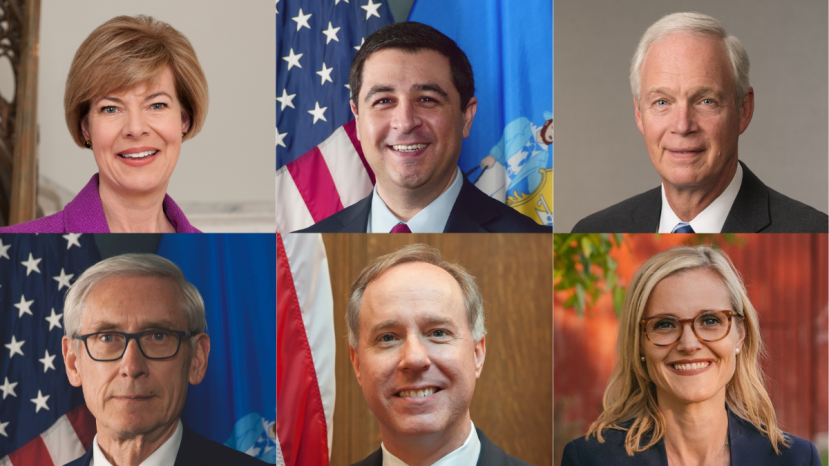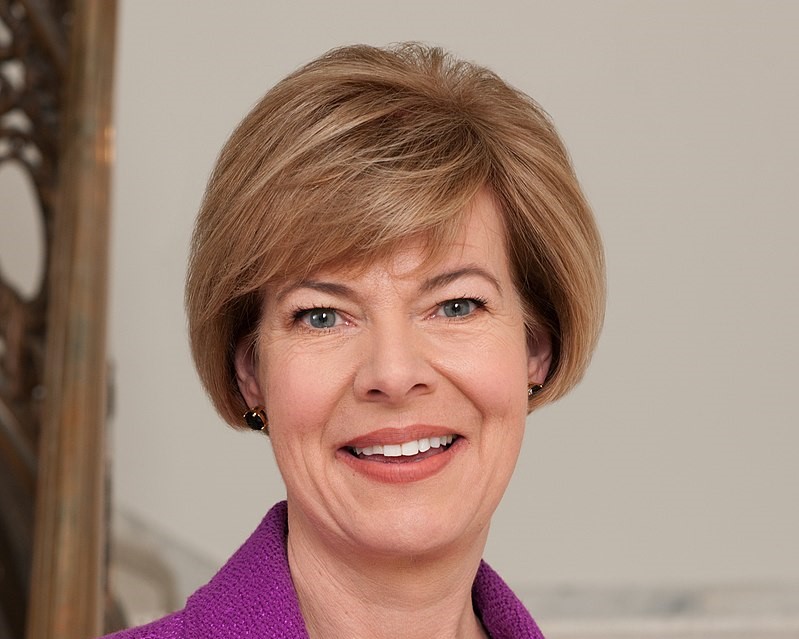
By Peter Cameron, THE BADGER PROJECT
Politicians at both the state and federal levels must report some of their assets and income every year. Those reports are public. For good reason.
“People need to understand that serving in government is a privilege. And it’s a choice,” said Donald Sherman, chief counsel of Citizens for Responsibility and Ethics in Washington D.C., a government watchdog group. “And certainly, the public is entitled to have government officials without conflicts of interest. A basic requirement of service is taking as many steps as possible to provide transparency and resolve conflict.”
Here’s where Wisconsin’s top politicians — keep their money, and why it matters.
Blind trusts – Gov. Tony Evers and U.S. Sen. Tammy Baldwin (Ds)
Though they are not required by law to do so, both Evers and Baldwin keep their assets in a blind trust. The goal is to avoid potential conflicts of interest for these politicians who wield enormous power, power that could potentially influence the price of a stock or other assets.
But just because a politician says their assets are now out of their control, that doesn’t necessarily mean they are free from conflicts.
“In order for a blind trust to be truly blind, you have to start from scratch,” Sherman said.
If a politician simply moved their assets into a blind trust when they took office, they would still know what they owned, Sherman noted, and could act to their personal benefit from their position of power to maximize their earnings. So they must sell off all their assets first so they don’t know what’s in the blind trust, Sherman said.
When Baldwin created the blind trust upon entering the Senate, she only had cash assets to put into the blind trust, not an existing investment portfolio, her communications director Eli Rosen wrote in an email to The Badger Project.
“Senator Baldwin has no knowledge of where her assets are invested or the composition of her portfolio,” he continued.
Evers’ press office did not respond to a question asking if he first sold all his assets before putting them in the trust.
Evers does not report the value of the assets in his blind trust.
Baldwin has a net worth of about $1.1 million, according to the most recent estimate by Open Secrets, a nonprofit that tracks money in politics. That puts her in the bottom half, but near the middle of the 100-member U.S. Senate in terms of wealth.
She reports between $500,000 and $1 million in her blind trust. She reports annual income from the trust between $5,000 and $15,000.
Baldwin also reports between $100,000 and $250,000 in credit union accounts.
And she reports a mortgage between $250,000 and $500,000 at a mortgage rate of 2.875%.
S&P Index fund – U.S. Sen. Ron Johnson (R)
Johnson is one of the richest members of the U.S. Senate, with an estimated net worth of $39 million, according to the most recent estimate by Open Secrets.
He reports between $5 million and $25 million in SPY, an index fund that mirrors the S&P 500 and contains many different stocks, including the largest holdings in Apple, Microsoft, Amazon, NVIDIA, Alphabet (Google), Tesla, META (Facebook), Berkshire Hathaway, and many others companies making up less than 2% of the total fund.
“We’ve been generally of the view that index funds are highly preferably to individual stocks,” said Donald Sherman, chief counsel of Citizens for Responsibility and Ethics in Washington, a government watchdog group.
Holders of index funds like SPY know what they hold, and that could have an effect on the owner, “consciously, or not,” when making votes, said Aaron Scherb, senior director of legislative affairs for the national office of Common Cause, another government watchdog group.
But the fund consists of many stocks, which helps spread out potential conflicts of interest, Sherman said.
“The best case scenario is that members don’t have these assets, or have truly blind trusts,” he added.
Johnson reports annual income from the index fund at $50,000 to $100,000 per year.
He reports between $5 million and $25 million in a money market account with Charles Schwab.
Johnson reports owning a commercial building in Oshkosh valued between $5 million and $25 million which generates income between $100,000 and $1 million.
And he reported selling an Arizona orchard in 2022.
Almost no reported assets – U.S. Rep. Gwen Moore (D-Milwaukee)
One of the least wealthy members of Congress, according to her financial disclosure report, Moore lists her only reportable asset as about $17,000 in the Wisconsin pension system.
She also reported a mortgage on her personal residence between $50,000 and $100,000.
Since her election to Congress in 2004, Moore has made more than $3 million from her congressional salary.
“Congresswoman Moore’s financial disclosures are accurate.” her press secretary, Samara Sheff, said in an email.
Of her financial reporting, Scherb said “some members of Congress come from very modest backgrounds. On its face, nothing seems suspicious about it.”
Very few reported assets – AG Josh Kaul (D)
Kaul, who has served as attorney general since 2019, reports a mutual fund of stock holdings valued between $5,000 and $50,000. The mutual fund, First Trust 9831: Ameriprise Top Picks, is spread out across a variety of stocks, with the largest holdings in Apple, Microsoft and Alphabet.
He doesn’t report any other assets.
Lots of rental properties and stock – Assembly Speaker Robin Vos (R-Burlington)
The top Republican in the state is a major landlord. He has a large holding of properties — 29 in total — most in the college town of Whitewater.
When Republicans had full control of state government, from 2011 to 2020, the legislature passed many landlord-friendly laws, an investigation by the Milwaukee Journal Sentinel found. Vos was not the only rental property owner in the state legislature, but he likely owns the most properties.
“As a conservative, I fundamentally believe in the idea of private property rights,” he told the newspaper.
Vos also reports owning RJV Carwash in Union Grove and his popcorn company Robin J Vos Enterprises Inc., which he lists as a food packaging and concession sales company.
And he reports stock holdings valued between $5,000 and $50,000 in the following companies:
- Amazon
- Automatic Data Processing
- Emerson Electric
- Exact Sciences
- General Dynamics
- General Mills
- Johnson & Johnson
- JP Morgan Chase
- Lockheed Martin
- Microsoft
- Norfolk Southern
- Northrup Grumman
- Packaging Corporation of American
- Paychex
- PPG Industries
- Procter & Gamble
- Quest Diagnostics
- Southwest Airlines
- Texas Instruments
- Toronto Dominion Bank
- Union Pacific
Lots of stock – Secretary of State Sarah Godlewski (D)
The new secretary of state is a multimillionaire who donated $1 million to her own campaign for U.S. Senate in 2022, which she abandoned to support the eventual nominee, former Lt. Gov. Mandela Barnes.
She disclosed stock holdings of more than $50,000 in Apple, Necessity Retail REIT, a real estate investment trust and Global Net Lease, an international real estate company, and between $5,000 and $50,000 in the following stocks:
- 3M
- AMD
- Alphabet (Google)
- Alteryx
- Amazon
- Applied Materials
- Atai Life Sciences
- Cisco Systems
- CitiGroup
- Comcast
- CVS
- DocuSign
- Edwards Lifesciences
- Exact Sciences
- Ford
- GE
- Intel
- Iron Mountain REIT
- JP Morgan Chase
- Lyft
- Mastercard
- Micron Technology
- Morgan Stanley
- NextEra Energy
- Oracle Corp
- Palantir Technologies
- PayPal Holdings
- ProLogis
- Resmed
- Roku
- Salesforce
- Shopify
- State Street
- Tesla
- Texas Instruments
- TJX Cos
- Uber
- Verisign
- Visa
- Disney
The Badger Project is a nonpartisan, citizen-supported journalism nonprofit in Wisconsin.
Categories: Investigations, Politics




